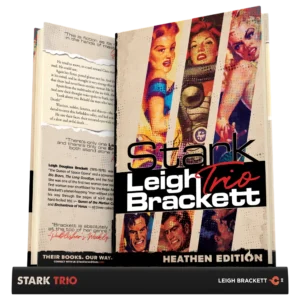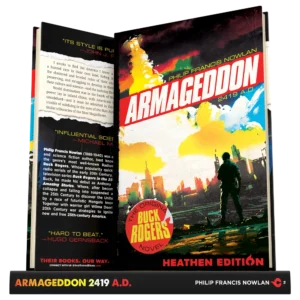No products in the cart.

Metropolis
Spine #61
Author
Thea von Harbou
Translator
Anonymous
First Edition
1925 / 1927
Heathen Edition
October 10, 2025
Refreshed
Pages
254
Heathen Genera
Hi-Sci-Fi
Paperback ISBN
978-1-948316-61-3
Hardcover ISBN
978-1-963228-61-8
Did he not live in a town which lay deeper under the earth than the underground stations of Metropolis, with their thousand shafts—in a town the houses of which storied just as high above squares and streets as, above in the night, did the houses of Metropolis, which towered so high, one above the other?
Had he ever known anything else than the horrible sobriety of these houses, in which there lived not men, but numbers, recognizable only by the enormous placards by the house-doors?
Had his life ever had any purpose other than to go out from these doors, framed with numbers, out to work, when the sirens of Metropolis howled for him—and ten hours later, crushed and tired to death, to stumble into the house by the door of which his number stood?
Was he, himself, anything but a number—crammed into his linen, his clothes, his cap? Had not the number also become imprinted into his soul, into his brain, into his blood, that he must even stop and think of his own name?
Thea Gabriele von Harbou (1888–1954) was a German screenwriter, author, film director, and actress best remembered as the screenwriter of the 1927 sci-fi classic Metropolis and the 1925 novel on which it was based . . . A dystopian and haunting vision of the future eerily resonant with our present—where humanity teeters between progress and collapse—where a privileged elite live above ground in luxurious gilded towers while oppressed workers slave below ground maintaining their monstrous machines. As tensions rise and revolution brews, Freder, the idealistic and privileged son of the city’s ruler, falls in love with Maria, a poor, compassionate woman from the underground who preaches peace and unity among the laborers. While searching for meaning in the fractured society, Freder defies his father’s authority and seeks to bridge the gap between the classes and unite the disparate social orders. Pulsing with mythic symbolism, philosophical depth, and poetic urgency, each page-turn of Metropolis feels like plunging deeper into a prophecy.
Test Your Might
Paperback
OTHER RETAILERS
Rate & Shelve It
Hardcover
OTHER RETAILERS
Rate & Shelve It
"A remarkable piece of work."
Michael Joseph
The Bookman
Heathenry
Contents
Praise
Details
Heathenry
As for the text, we may never know who first translated the book into English as that information has never been released — as far as we’re aware — however, we do know that the translation was commissioned in England, likely by The Readers Library Publishing Company Ltd., so the original was rife with British spellings, which we have jettisoned in favor of their American counterparts.
Additionally, we have modernized several hyphened words so they’re a bit easier to read: to-night is now tonight, good-bye has become goodbye, and so on.
We’ve also appended 130+ footnotes to enhance your reading of the text, and to provide clarity, context, and commentary where necessary.
Contents
Heathenry: Thoughts on the Text
Metropolis
Metropolis
Praise
“Metropolis is unlike any other novel yet written. The impression it leaves is of a work of genius, distinctly unique and original.” —The Readers’ Library
“Behind the weird story of the great Armageddon between mankind and monsters . . . is the romance of a young woman who conceived the nightmare plot in a dream and was impelled by some strange force over which she had no control to set it down on paper. She is Thea von Harbou . . . ” —The China Mail
“Metropolis somewhat resembles a mixture of H.G. Wells, Jules Verne, and Edward Bellamy, with perhaps a touch of Mrs. Shelley’s Frankenstein.” —The Evening Star
“It is a remarkable piece of work, skillfully reproducing the atmosphere one has come to associate with the most ambitious German film productions. Suggestive in many respects of the dramatic work of Karel Capek and of the earlier fantastic romances of H.G. Wells, in treatment it is an interesting example of expressionist literature . . . Metropolis is one of the most powerful novels I have read.” —Michael Joseph, The Bookman
“Thea von Harbou excelled in the one aspect of literary craftsmanship that critics tend to ignore because it is utterly beyond their ability to comprehend: the power of myth-making.” —Gary Westfahl
“Thea von Harbou, its gifted authoress, in her lifetime exhibited a literary mind that leapt ahead of reality . . . the language of the novel is sometimes as thesauric as Shiel, as kaleidoscopic as Merritt, as bone-spare as Bradbury, as poetic as Poe, as macabre as Machen . . . you will have an experience in reading that will last you all the rest of your life.” —Forrest J. Ackerman
“In Metropolis we shall see the author’s prophecy of what Capital and Labor may come to unless they cooperate in mutual sympathy. The story is by Thea von Harbou, the Jules Verne of Germany, and probably the greatest living woman novelist.” —The Nottingham Evening Post
Details
Metropolis
Heathen Edition #61Published: October 10, 2025
Format: Paperback
Interior: Black & White on Cream Paper
Pages: 254 (+2 POD)
Language: English
Annotations: 134 Footnotes
Illustrations: 2
The Heathen Newsletter
Want to be kept in the loop about new Heathen Editions, receive discounts and random cat photos, and unwillingly partake in other tomfoolery? Subscribe to our newsletter! We promise we won’t harass you – much. Also, we require your first name so that we can personalize your emails. ❤️
@heatheneditions #heathenedition
Copyright © 2026 Heathen Creative, LLC. All rights reserved.




